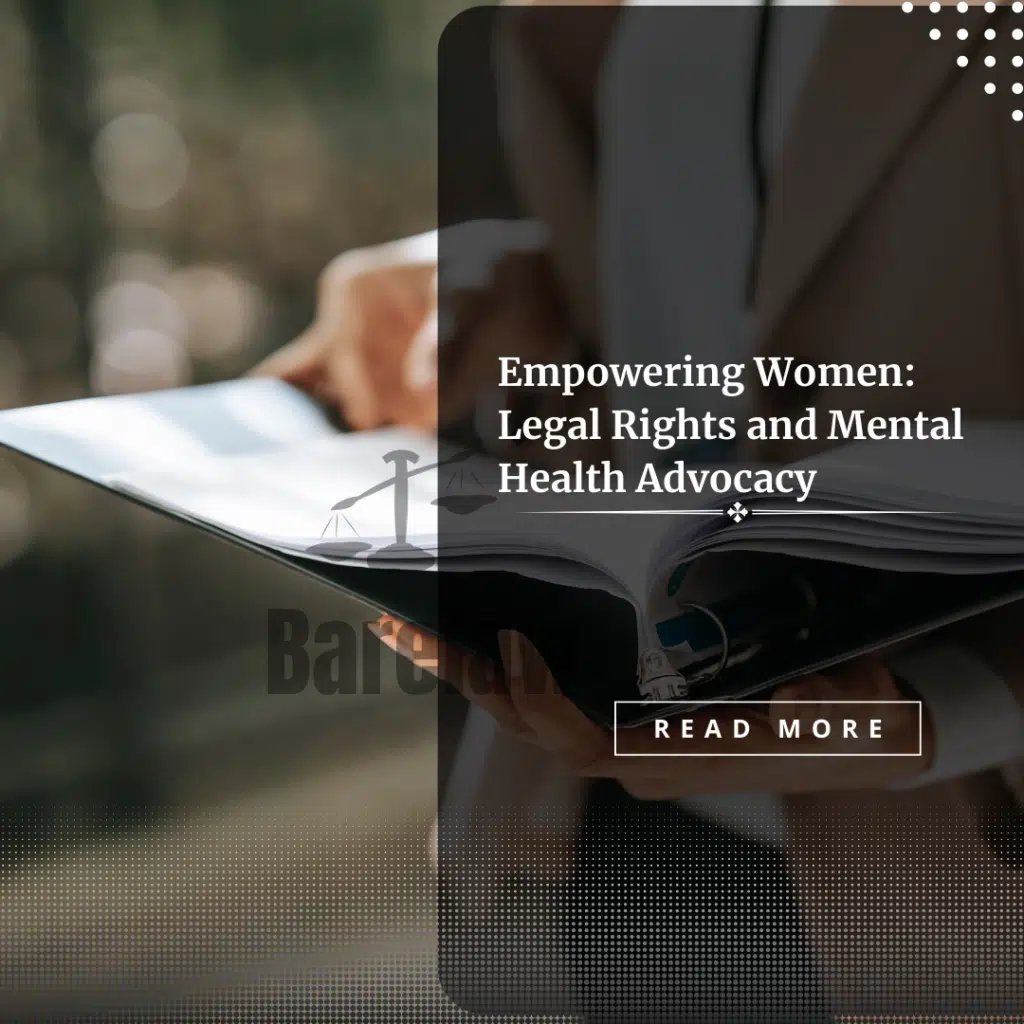
Table of Contents
Empowering Women: Legal Rights and Mental Health Advocacy
Empowering Women: Legal Rights and Mental Health Advocacy
Mental health is an essential part of our overall well-being, but it is often overlooked when considering women’s rights. Women face many obstacles in this area due to stereotyping by society, misunderstanding and ignorance among people as well as their own unawareness about the issue sometimes. This text examines legal aspects concerning mental health for females with emphasis on care rights, support systems available and stigma free environment provision. We can help them do so by tackling these problems because they will be enlightened more to take care of themselves mentally and also we want a community which values mental wellness as a basic human right.
Legal Rights to Mental Health Care
Quality mental healthcare should be accessible to everyone regardless of sex or gender identity; furthermore it should not only be affordable but also convenient. Legal frameworks ought to guarantee that there is equality in access to different types of therapies, treatments and services offered for mental ailments since women have unique needs arising from social expectations placed upon them coupled with hormonal imbalances during various stages like menopause etcetera. All countries around the globe are realizing the significance of making this possible through provision cheaply available mental health facilities without systemic financial barriers faced mainly by ladies.
Overcoming Stigma and Misconceptions
There still exists significant amounts of stigma towards seeking assistance when one has a mental illness especially among females compared to males who are encouraged even celebrated once they start addressing such concerns openly. Stigmatization acts as a stumbling block preventing women from talking freely about their psychological distress hence hindering necessary intervention measures being put place faster than expected thereby prolonging suffering periods unnecessarily. In order create conducive environments where all people including girls can freely share information related with their personal experiences regarding these issues; laws need amendment hence promoting more awareness campaigns against stereotypes that perpetuate stigmatization thus influencing perception change within society at large.
Confidentiality and Privacy
Privacy together confidentiality play a critical role in ensuring successful treatment outcomes for patients receiving psychiatric help. Women should feel safe enough to seek professional assistance without worrying about their secrets being exposed or shared with others; hence the importance of establishing legal safeguards which protect such rights. There is need for enacting tough laws as well regulations governing mental health care providers’ conduct when dealing with clients’ information. This will enable professionals keep highest levels of confidentiality so that women can speak openly concerning what worriers them most during therapy sessions.
Support for Vulnerable Groups
Certain communities face double jeopardy situations which make it even harder them access services related to emotional wellbeing like anxiety management skills among other things because they may be located far away from centers offering these types support. It is therefore important that government policies take into account needs women who have been marginalized due either poverty, cultural practices or discrimination based on gender identity etcetera by ensuring availability culturally sensitive mental health care facilities within reach for this particular category individuals through special initiatives targeting victims domestic violence survivors with disabilities and LGBTQ+ community at large.
Maternal Mental Health
The journey towards becoming a mother can trigger wide range feelings and emotions thus making mental health an integral part of reproductive care package especially during prenatal period through postnatal stages including breastfeeding where some mothers may develop postpartum depression (PPD) or any other related condition(s). Legal frameworks must be put place provide pregnant expectant mothers access appropriate psychological assistance tailored meet various challenges associated with these phases in their lives while also recognizing impact such disorders might have both on child well-being since it underscores need supportive measures take care children’s early development needs considering the fact that new born babies rely exclusively upon parents/guardians primary caregivers for all aspects survival growth.
Workplace Mental Health
Many women struggle find work-life balance because many times they are faced with choice between advancing career working overtime; compromising personal wellness necessary rest required by bodies so as prevent burnout thereby affecting overall performance levels at workplace negatively leading poor job satisfaction rates amongst female employees general. Legal provisions need be made so that employers create conducive working environments where employees feel supported emotionally as well physically through provision flexible hours or even days off when needed without fear victimization or dismissal due perceived lack commitment towards organization’s goals objectives since some female workers may not ready disclose reasons behind their requests for time away from duties.
Mental Health Advocacy
besides being able take charge own wellbeing promote rights within society there other areas that need attention women empowerment this regard i.e., mental health advocacy which calls upon different stakeholders including legal professionals working closely together Women’s organizations Mental Health Advocates come up with policies aimed at ensuring more people get access care services also fight against any form discrimination while seeking treatment necessary changes are driven through policy reviews campaigns challenging unfair practices impede equal opportunities among males females concerning issues related to psychological distress.
Conclusion
Taking into account the legal facets of women’s mental health is necessary in order to create a society that recognizes and gives importance to psychological well-being. We have the power to enable females to seek aid, place priority on their mental health and live satisfied lives by ensuring parity with other areas of healthcare provision, eliminating social stigmatization as well as backing supportive policies. Legal systems provide strong platforms for change by providing necessary support systems and information sources which can be used in navigating through mental illness complexities while at the same time freeing one from societal expectations or prejudices about what constitutes sanity; thus making over someone else’s state of mind becomes an act for personal empowerment too. When we empower women’s minds, we empower their whole existence.



